Wave property of electrons implies that they will show diffraction effects. Davission and Germer demonstrated this by diffracting electrons from crystals. The law governing the diffraction from a crystal is obtained by requiring that electron waves reflected from the planes of atoms in a crystal interfere constructively (see figure)

In an experiment, electrons are made to pass through a narrow slit of width 'd' comparable to either de-Broglie wavelength. They are detected on a screen at a distance 'D' from the slit

The following graphs that can be expected to represent the number of electrons 'N' detected as a function of the detector position 'y' (y=0 corresponds to the middle of the slit) is




The correct Answer is:D
Related Playlists
- BOOK - NARAYNACHAPTER - WAVE OPTICSEXERCISE - LEVEL - VI40videos
WAVE OPTICS
- BOOK - NARAYNACHAPTER - WAVE OPTICSEXERCISE - LEVEL - I(H.W)20videos
WAVE OPTICS
- BOOK - NARAYNACHAPTER - WAVE OPTICSEXERCISE - NCERT Based Questions25videos
WAVE OPTICS
- BOOK - NARAYNACHAPTER - SEMICONDUCTOR ELECTRONICSEXERCISE - ADDITIONAL EXERCISE (ASSERTION AND REASON TYPE QUESTIONS :)19videos
SEMICONDUCTOR ELECTRONICS
Similar Practice Problems
- Question 1 - Select One
In an experiment, electrons are made to pass through a narrow slit of width d comparable to their de Broglie wavelength. They are detected on a screen at a distance D from the slit (see figure).<br>
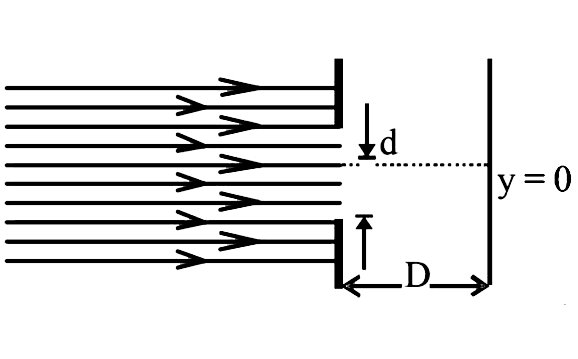
Which of the following graphs can be expected to represent the number of electrons N detected as a function of the detector position y (y=0 corresponds to the middle of the slit ).A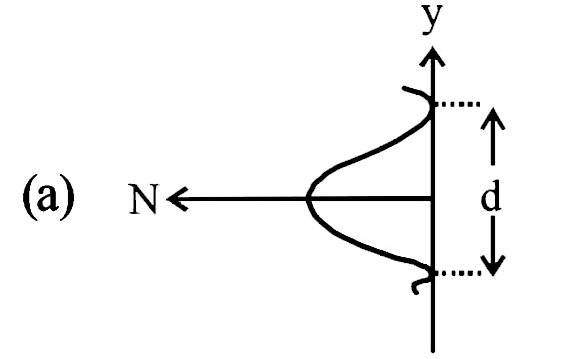 B
B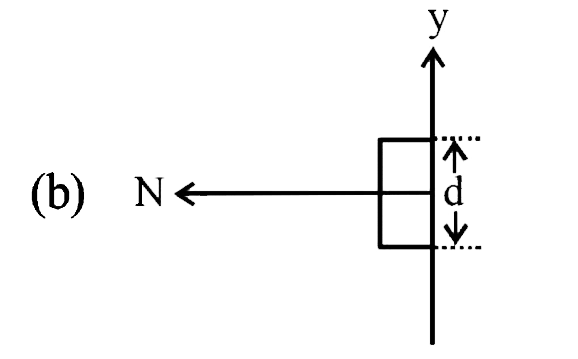 C
C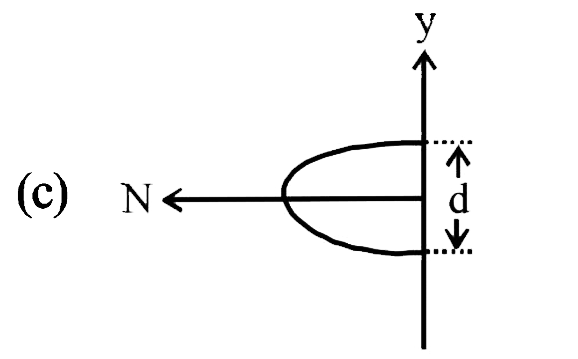 D
D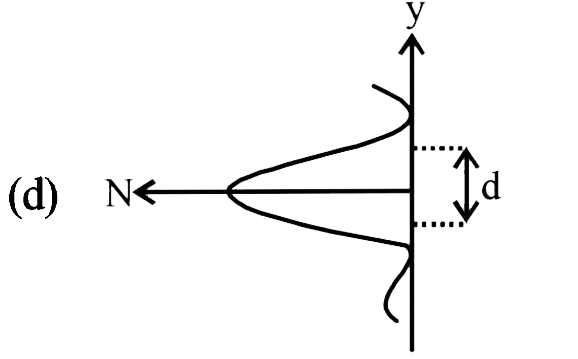
- Question 1 - Select One
Wave property of electrons implies that they will show diffraction effects. Davission and Germer demonstrated this by diffracting electrons from crystals. The law governing the diffraction from a crystal is obtained by requiring that electron waves reflected from the planes of atoms in a crystal interfere constructively (see figure)
_E01_233_Q01.png)
The surface of a metal is illuminated with the light of 400nm. The kinetic energy of the ejected photoelectrons was found to be 1.68eV. The work function of the metal is : (hc=1240eV−nm)A1.51eVB1.68eVC3.09eVD1.42eV - Question 1 - Select One
Wave property of electron implies that they will show diffraction effected . Davisson and Germer demonstrated this by diffracting electron from crystals . The law governing the diffraction from a crystals is obtained by requiring that electron waves reflected from the planes of atoms in a crystal inter fere constructiely
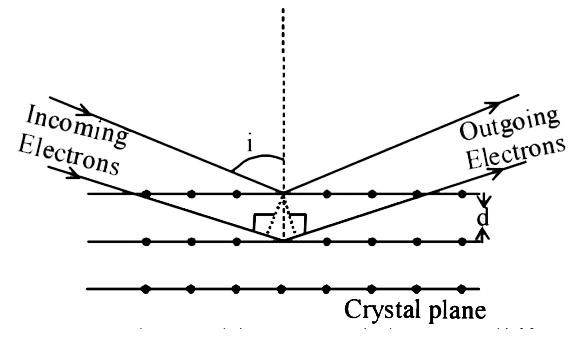
If a strong diffraction peak is observed when electrons are incident at an angle i from the normal to the crystal planes with distance d between them (see fig) de Brogle wavelength λdB of electrons can be calculated by the relationship (n is an intenger)Adsini=nλdBB2dcosi=nλdBC2dsini=nλdBDdcosi=nλdB - Question 1 - Select One
Wave property of electron implies that they will show diffraction effected . Davisson and Germer demonstrated this by diffracting electron from crystals . The law governing the diffraction from a crystals is obtained by requiring that electron waves reflected from the planes of atoms in a crystal inter fere constructiely
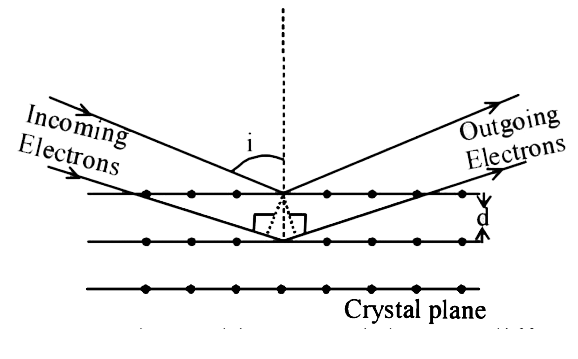
Electron accelerated by potential V are diffracted from a crystal if d=1Åandi=30∘,V should be about (h=6.6×10−34Js,me=9.1×10−31kg,e=1.6×10−19C)A2000VB50VC500VD1000V - Question 1 - Select One
In Davission and Germer experiment, the function of nickel crystal is
Ato absorb the incident beam of electronBto absorb the incident beam of electronCto diffract the incident beam of electronDto refract the incident beam of electron
Similar Questions
In an experiment, electrons are made to pass through a narrow slit of width d comparable to their de Broglie wavelength. They are detected on a screen at a distance D from the slit (see figure).<br>

Which of the following graphs can be expected to represent the number of electrons N detected as a function of the detector position y (y=0 corresponds to the middle of the slit ).View SolutionIn an experiment, electrons are made to pass through a narrow slit of width d comparable to their de Broglie wavelength. They are detected on a screen at a distance D from the slit (see figure).<br>

Which of the following graphs can be expected to represent the number of electrons N detected as a function of the detector position y (y=0 corresponds to the middle of the slit ).View SolutionWave property of electrons implies that they will show diffraction effects. Davission and Germer demonstrated this by diffracting electrons from crystals. The law governing the diffraction from a crystal is obtained by requiring that electron waves reflected from the planes of atoms in a crystal interfere constructively (see figure)
_E01_233_Q01.png)
The surface of a metal is illuminated with the light of 400nm. The kinetic energy of the ejected photoelectrons was found to be 1.68eV. The work function of the metal is : (hc=1240eV−nm)View SolutionWave property of electron implies that they will show diffraction effected . Davisson and Germer demonstrated this by diffracting electron from crystals . The law governing the diffraction from a crystals is obtained by requiring that electron waves reflected from the planes of atoms in a crystal inter fere constructiely

If a strong diffraction peak is observed when electrons are incident at an angle i from the normal to the crystal planes with distance d between them (see fig) de Brogle wavelength λdB of electrons can be calculated by the relationship (n is an intenger)View SolutionWave property of electron implies that they will show diffraction effected . Davisson and Germer demonstrated this by diffracting electron from crystals . The law governing the diffraction from a crystals is obtained by requiring that electron waves reflected from the planes of atoms in a crystal interfere constructiely

Electron accelerated by potential V are diffracted from a crystal if d=1Åandi=30∘,V should be about (h=6.6×10−34Js,me=9.1×10−31kg,e=1.6×10−19C)View Solution

